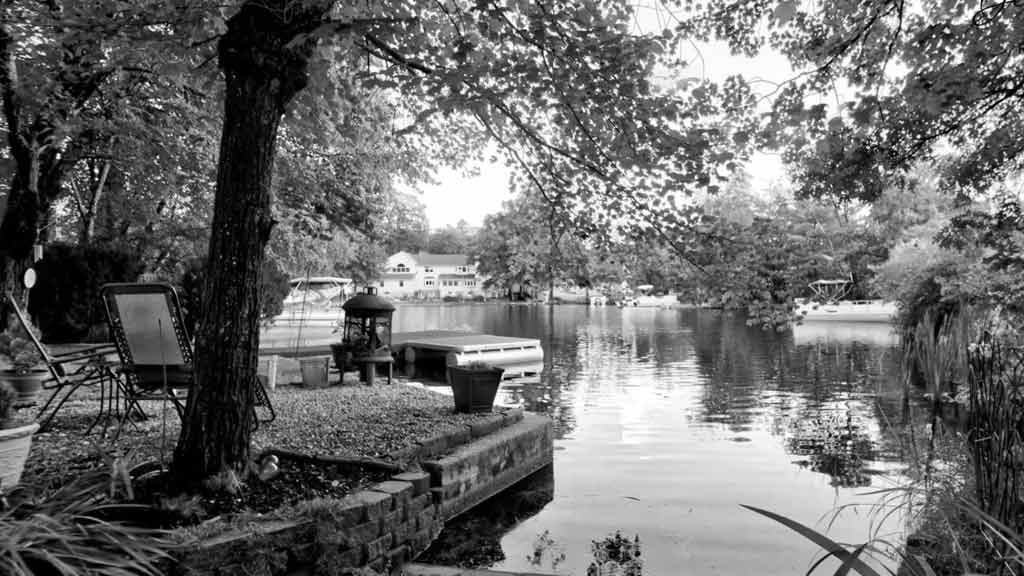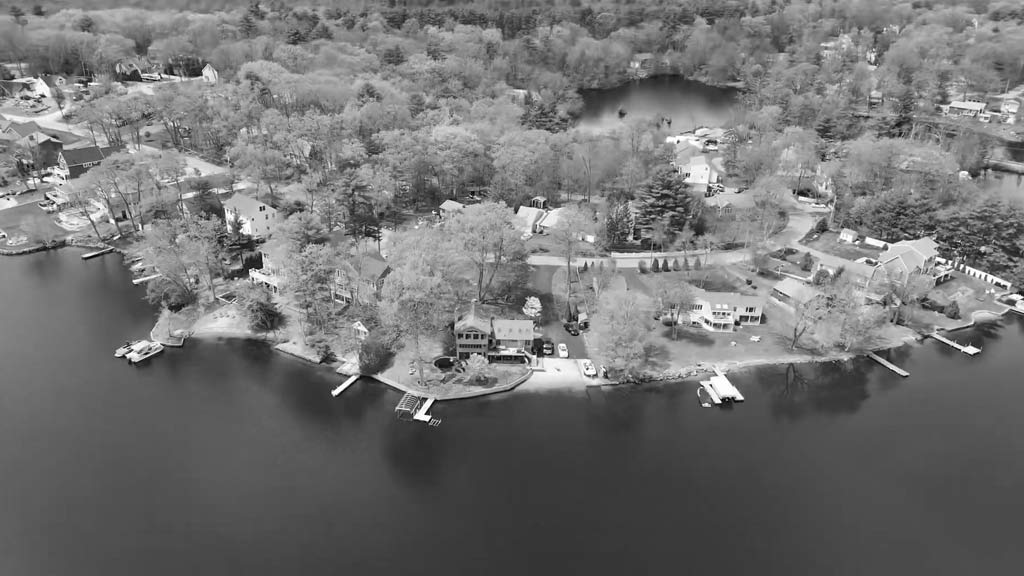Discover the rich history of Arlington Pond in Salem, NH, a place steeped in industrial significance and natural beauty.
In 1905, the Arlington Mills Corp erected the Walter Stickney Dam on the Spicket River, creating the present-day granite block and concrete structure.
This dam, with a height of ten feet and a length of eighty feet, played a crucial role in supplying water for industrial use in the early 1920s when the mills faced water shortages.
The construction of an auxiliary reservoir, now known as Arlington Mill Pond, added to the area’s industrial importance.
Over the years, this site witnessed not only industrial growth but also social activities, with Conley’s Grove becoming a hub for entertainment in the 1930s.
The legacy of the Walter Stickney Dam and the Arlington Mills stands as a testament to the industrial heritage of the region, shaping the landscape of Salem, NH, for generations to come.
Historical Overview of Arlington Pond
Arlington Pond, located in Salem, New Hampshire, has a rich history that spans centuries. Originally inhabited by indigenous peoples, the area around Arlington Pond was likely used for fishing and hunting by Native American tribes long before European settlers arrived.
Origins and Development
The history of Arlington Pond in Salem, NH, dates back to 1905 when the Arlington Mills Corp constructed the Walter Stickney Dam.
This granite block and concrete dam, standing ten feet tall and eighty feet long, played a crucial role in providing water for industrial activities in the early 1920s.
Facing water supply challenges, the mills created an auxiliary reservoir known today as Arlington Mill Pond, augmenting water resources from Big Island Pond.
This innovative solution allowed the mills to sustain their operations and paved the way for the growth of Arlington Pond as a recreational spot.
Over the years, the pond has evolved into a popular destination for boating, fishing, and watersports, attracting visitors from near and far.
Key Events and Changes Over Time

Over the years, Arlington Pond has witnessed significant transformations and key events. In the 1930s, Conley’s Grove emerged as a vivid social hub with a dance pavilion, drawing crowds for parties and gambling.
These social activities added a colorful dimension to the industrial landscape of the region, reflecting the area’s dynamic evolution over time.
The legacy of Arlington Pond, marked by the constructions of the dam and auxiliary reservoir, underscores the industrial heritage and social fabric of Salem, NH, shaping its identity for future generations.
Environmental and Geographical Impact
The environmental and geographical impact of Arlington Pond in Salem, New Hampshire, has evolved over time due to human activity and natural processes.
Ecosystem and Biodiversity
Arlington Pond in Salem, NH, has played a crucial role in supporting a diverse ecosystem and promoting biodiversity in the region.
With its rich aquatic habitat, the pond serves as a home to various species of fish, birds, and plant life.
The clean and well-maintained waters of Arlington Pond have created a thriving environment for wildlife, contributing to the overall biodiversity of the area.
The conservation efforts around the pond have helped preserve the delicate balance of the ecosystem, ensuring the sustenance of numerous species for future generations.
Effects on Local Climate
The presence of Arlington Pond has had notable effects on the local climate of Salem, NH. The large surface area of the pond influences temperature regulation in the surrounding area, acting as a natural cooling agent during hot summers and a moderating factor during cold winters.
Additionally, the evaporation and condensation processes occurring on the pond’s surface impact local humidity levels, contributing to the overall climate dynamics of the region.
Arlington Pond’s presence has created a microclimate that influences weather patterns and enhances the environmental conditions in Salem and its surroundings.
Recreational and Cultural Significance
The recreational and cultural significance of Arlington Pond in Salem, New Hampshire, is deeply rooted in its history and natural beauty.
Here’s an overview of its importance:
Activities and Community Events

Arlington Pond in Salem, NH, has been a hub of recreational activities and community events for decades. Fishing, boating, swimming, and picnicking are popular pastimes enjoyed by locals and visitors alike.
The annual “Pond Fest” celebrates the rich community spirit with music, food vendors, and water sports competitions.
Families often gather at the pond’s shore for leisurely outings and social gatherings, creating lasting memories in this picturesque setting.
Contribution to Local Heritage
Arlington Pond holds significant cultural value, deeply rooted in the history of Salem, NH. The pond’s establishment in the early 1900s has shaped the local heritage, serving as a focal point for social interactions and leisure activities.
The evolution of Arlington Mill Pond into Arlington Pond marked a pivotal moment in the town’s narrative, preserving its industrial past while embracing recreational opportunities for residents.
The pond’s conservation efforts not only safeguard its natural ecosystem but also uphold its historical significance, ensuring that future generations can continue to enjoy its rich heritage.
Challenges and Conservation Efforts
Challenges and conservation efforts surrounding Arlington Pond in Salem, New Hampshire, are crucial for preserving its ecological health and recreational value.
Here’s an overview:
Pollution and Restoration Initiatives
When it comes to Arlington Pond in Salem, NH, pollution has been a significant concern over the years. Contamination from various sources such as runoff, littering, and improper waste disposal has threatened the water quality and ecosystem of the pond.
High levels of pollutants can harm aquatic life, disrupt the natural balance, and affect recreational activities around the pond.
To address these challenges, concerted restoration initiatives have been put in place. These efforts focus on reducing pollution sources, implementing proper waste management practices, and restoring the ecological health of Arlington Pond.
Restoration projects may include shoreline cleanups, stormwater management programs, and water quality monitoring to ensure the long-term sustainability of the pond.
Community Involvement in Preservation
Community involvement plays a crucial role in the preservation of Arlington Pond. Local residents, environmental organizations, and authorities come together to protect and conserve this natural asset.
Through awareness campaigns, volunteer programs, and educational initiatives, the community actively participates in safeguarding the pond’s ecosystem and heritage.
By engaging in preservation activities, the community fosters a sense of ownership and responsibility towards Arlington Pond.
This collective effort not only ensures the pond’s conservation for future generations but also strengthens community bonds and reinforces the importance of environmental stewardship.
Frequently Asked Questions
What is the significance of Arlington Pond in Salem, NH?
Arlington Pond is a vital recreational and cultural hub in Salem, NH, hosting community events like Pond Fest. It preserves the town’s heritage and supports social interactions, offering various recreational opportunities.
How does pollution impact Arlington Pond’s ecosystem?
Pollution from runoff and improper waste disposal poses a threat to Arlington Pond’s ecosystem and water quality.
How can the community get involved in preserving Arlington Pond?
Community involvement is crucial in safeguarding Arlington Pond. Residents, environmental organizations, and authorities collaborate through awareness campaigns and volunteer programs to protect the pond’s ecosystem and heritage, ensuring conservation for future generations.
Conclusion
Preserving Arlington Pond’s heritage and ecosystem is a shared responsibility that requires ongoing community engagement and environmental stewardship.
By addressing pollution challenges and implementing restoration initiatives, the local community can ensure the pond’s ecological health and historical significance for future generations.
Through collaborative efforts between residents, organizations, and authorities, Arlington Pond in Salem, NH, can continue to serve as a vital recreational and cultural hub, fostering community bonds and promoting sustainable practices.
Your involvement in conservation activities and awareness campaigns plays a crucial role in safeguarding the pond’s ecosystem and preserving its rich history.
Together, we can protect Arlington Pond’s legacy and maintain its value as a cherished natural resource in the Salem community.
Jaclyn Lowe